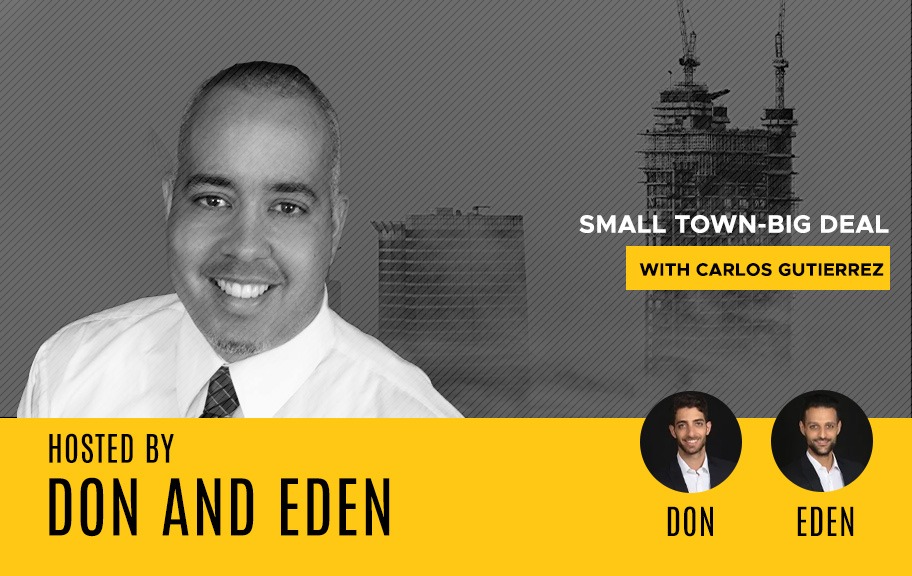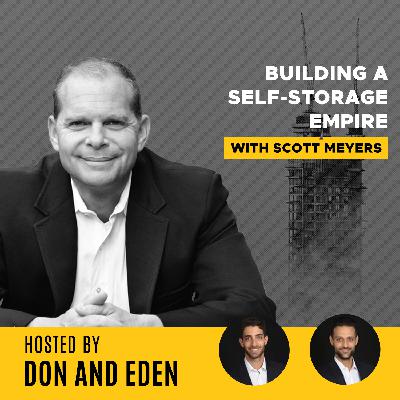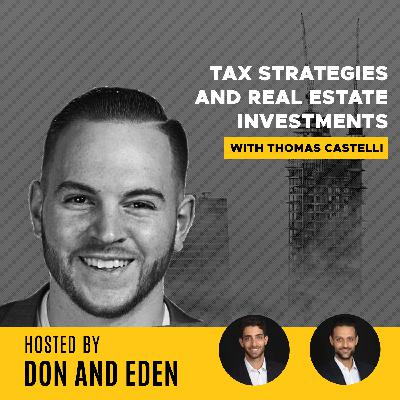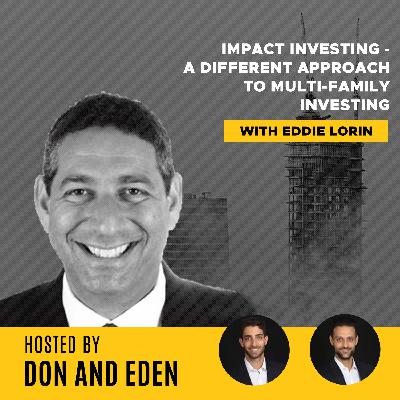DE 29: When & Where to Invest with Andrew Syrios
Description
Andrew Syrios has been in the real estate business for over 10 years. Born in a real estate investing family, he was mentored by his father, Bill Syrios, who is also a real estate investor. His father started investing in the early 80s. Andrew is based in Kansas City, MO. He joined the family business straight out of college. He is the owner of more than 500 units in Missouri and manages own portfolio. His real estate preference is to buy and hold for cash flow.
In this episode, both Andrew and Don discuss their experience in real estate investing. Andrew gives a lot of details about how, when and where to invest. Andrew discusses his thoughts on a possible recession along with possible factors to look for. Also the importance of standardizing certain tasks in order to streamline your business, get more done and have everyone on the same page.
Episode Highlights:
- When and How He Started Investing
- Tenant vs. the Landlord Friendly States
- His Criteria For Choosing a Property
- Importance of Having Systems & Policies in Place
Connect with Andrew:
Website: Andrewsyrios.com
Podcast: The Good Stewards Podcast
- - - - - - - - - - - - - - - - - - - - - - - - - - - - - - - - - - - -
TRANSCRIPTION
Intro: Hey guys. On today's episode, we're going to have Andrew Syrios. Andrew had been investing in real estate for the past 10 years. He does mostly single families and some small multi-families in Kansas City, Missouri. I like the fact that he's scaling a business that most people say is unscalable, which proves time and time again that there are many ways to become a successful real estate investor. So stay tuned and enjoy the interview.
Lady: Welcome to the commercial real estate investing podcast with Don and Eden where we cover all aspects of real estate investing with special attention to off-market strategies.
Don: Hey, Andrew, welcome to the show.
Andrew: Hey, thank you for having me.
Don: Yes. You're welcome. I know you're based off Kansas City, Missouri?
Andrew: Yes. Good old Kansas City.
Don: Yeah. And we just had a lovely conversation about Kansas City is one of the only cities that are two cities divided into two states. So, we were talking about how it is to be a real estate investor in an area like that. So, I guess I would want to ask you that again so that you could clarify to our audience a little bit about that.
Andrew: Put it on the record. Yeah, I mean, it is interesting. I mean, we call it KC Mo and KC K, we're based on the Missouri side. Every city's got different pockets, good areas, bad areas, areas that are too expensive for buy and hold and rentals and whatnot. I'd say the biggest issue is kind of there are some hard breaks particularly like Kansas City, Missouri has the main part of downtown Kansas City is in KC Mo. And when you go across the river there and the KC K, it shifts pretty drastically. So, you have some pretty drastic changes in some parts. In some areas, you go across the state line, and it's like nothing changed at all. That's some of it but also there are some law changes. That's also true. The county, they're six counties in the Kansas City, Missouri metro area. The laws are a little bit different. For example, in Jackson County, Missouri, the evictions can take substantially longer than they take Johnson County or Wyandotte county is what has Kansas City, Kansas. But at the same time when you evict someone, you have to store their stuff for a little while on the Kansas side. Missouri said they just tell you to throw them on the lawn.
Don: Is it a tenant-friendly state?
Andrew: I would say both Kansas and Missouri are pretty in the middle. But I think Kansas is probably a little bit more so on the tenant-friendly side.
Don: I know a lot of investors that would steer away from tenant-friendly states, and it's understandable. It's difficult.
Andrew: Yeah, well, if they put in something like California, and I think Oregon just put in rent control, and New York has a long history of that. And that can make it very difficult to make margin especially in these expensive places where you know, it's it takes so much money to buy a property and then you can't rent it up to the market. There's something in Kansas City they're trying to push for like the Kansas City tenant Bill of Rights. This would only be for Kansas City, Missouri, won't even be for other cities in Missouri, but it has some weird language. I'm not a lawyer, so I won't try to parse it out. But stuff like trying to restrict your ability to do tenant screening, and that's been sort of a thing throughout the country as well, which makes it particularly risky, especially if you either can't do it or can't do as many banks can do it stuff like that. I think it's just something that a lot of buying hold investors need to take into account when they're looking at an area. Generally, it's going to be probably trickier than that. It's not going to be impossible, but it's going to be more difficult something you need to be more prepared for.
Don: Yeah, most definitely. I just had a very interesting conversation with somebody that I did some networking with. And he's coming from New York, he's a nice guy, made some fortunate in real estate. And now he's telling me he's got a situation with one of the buildings that he owns. The building, he's trying to sell it and the building is worth around $2,000,000, but since it has tenants inside, it's worth around $1,200,000. Because in New York, you can't raise the rent unless you have renovated 75% of the building. And I'm sorry if I'm wrong about this, I'm not sure that's what I heard from him. And this is a true story. He's saying that the tenants hired attorneys, and they're asking him for $100,000 each to leave.
Andrew: I've heard of stuff like that where they're trying to do developments and there is that one guy like I'm not leaving no matter what.
Don: One tenant he said he's asking for $200,000. That was a point where I figured out that I'm done with this and he took his stuff, his family, everything and he just moved to Florida. I'm based out of Florida, Florida is very, very friendly with the landlords. It's very easy to do things here. And that's why you got a lot of investors. So, I would not even be able to fathom the idea of investing in a tenant-friendly state. But I know a lot of people do that.
Andrew: Obviously, tenants do need some protection. I despise slumlords as much as the next guy. And I don't think these things help that I think what they do is drive investment money out of the real estate, which is if you want to reduce the cost of housing and you want to make housing more affordable, the biggest thing you need to do is push investment into real estate. And so, it's completely counterproductive. Although I think it is important to recognize that tenants do need some protections they absolutely You know, there are slumlords out there and we especially I think as real estate investors should do our part to try to shame those slumlords into basically changing their ways because although I think a lot of them either incompetence or they ran out of money. Real Estate Investors go bankrupt too. So that's part of the equation. You can't raise rents. You can't do tenant screening. The biggest complaint we get from tenants like properties we're looking at is don't let anybody in here. That's not pro-tenant that's an extremely anti tenant. So...
Don: I want to talk a little bit about yourself and your career. So, I know that you've been investing in real estate in the past 10 years. I know that in Kansas City, Missouri alone, you own over 500 units. You're also managing your own portfolio, which is very, very interesting. Also, there's another interesting fact about you, Andrew, and that is the fact that you had your father as a figure, as a real estate investor in your life, and you're kind of stepping into his shoes. So, I want to ask you about that in particular, and how that affected your real estate career.
Andrew: My father got started real estate in Oregon back in the late 80s. And I was kind of when I was growing up and he bought a lot of student housing at the University of Oregon, which turned out to be a very good investment at that time. When I graduated from college, we were flipping houses. And eventually got kind of sick of that because basically, student housing got too expensive to buy and hold with anymore. Eventually variety reasons we came out to the Midwest, whereas housing prices are less expensive. It's easier to cash flow and my brother into joining me out here but my father is still in real estate.
We have a podcast that we do the ‘Good Stewards Podcast’, it's a weekly thing on real estate, we just go over real estate topics and he's still very involved in the company focuses on Oregon. The way we like real estate is to buy and hold for cash flow. I like that Midwest markets that peaks and valleys aren't as high low in the Midwest, the South kind of those cash flow areas. And we want properties that can cash flow well. Some people are a little bit more into the vine, an area that's improving in one of these coastal markets that have a lot of upward potentials. There's upward potential here, but I just personally stress if the property cash flows with the appreciations are great, that's kind of the
























Great one Don thanks for mention me - Lior